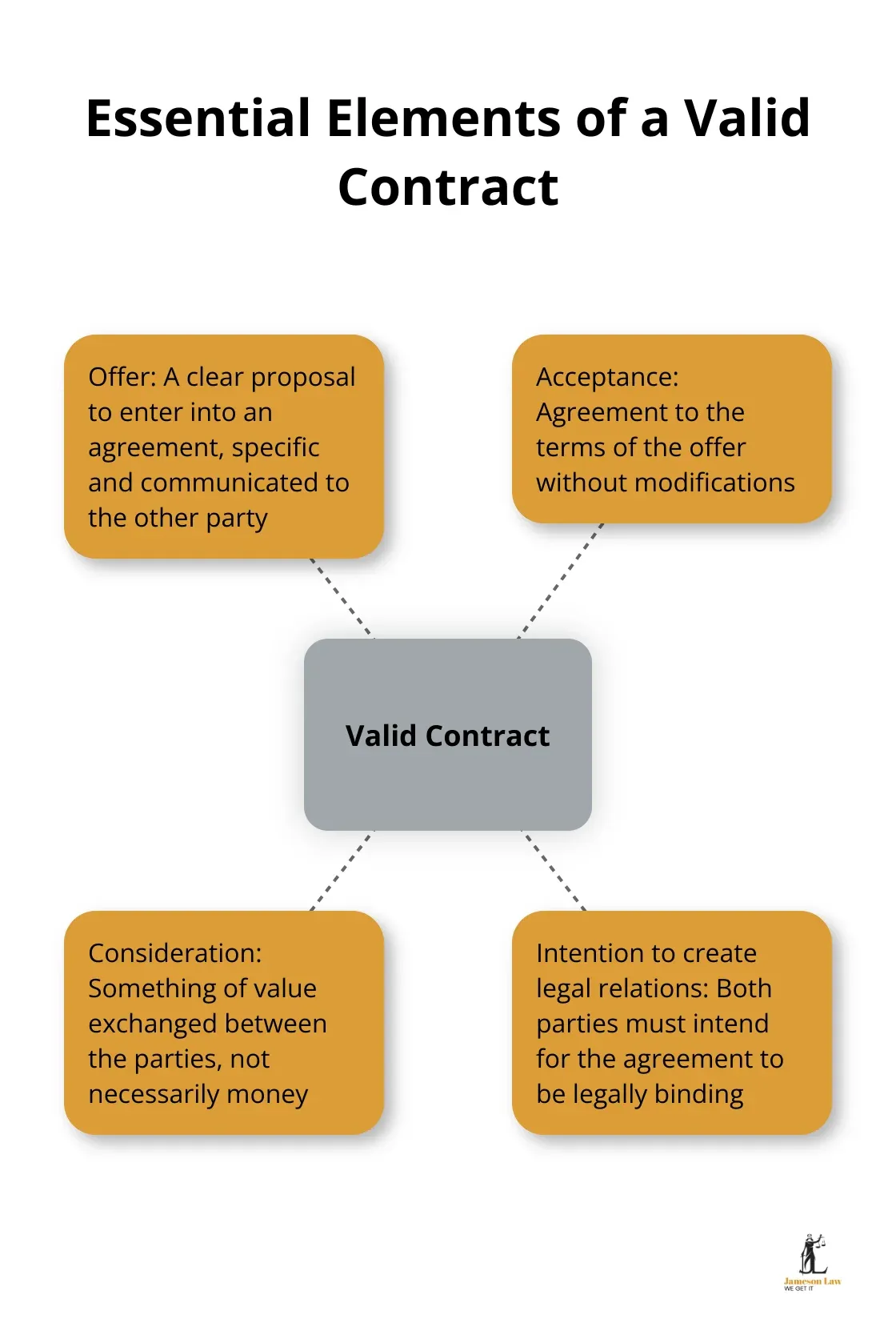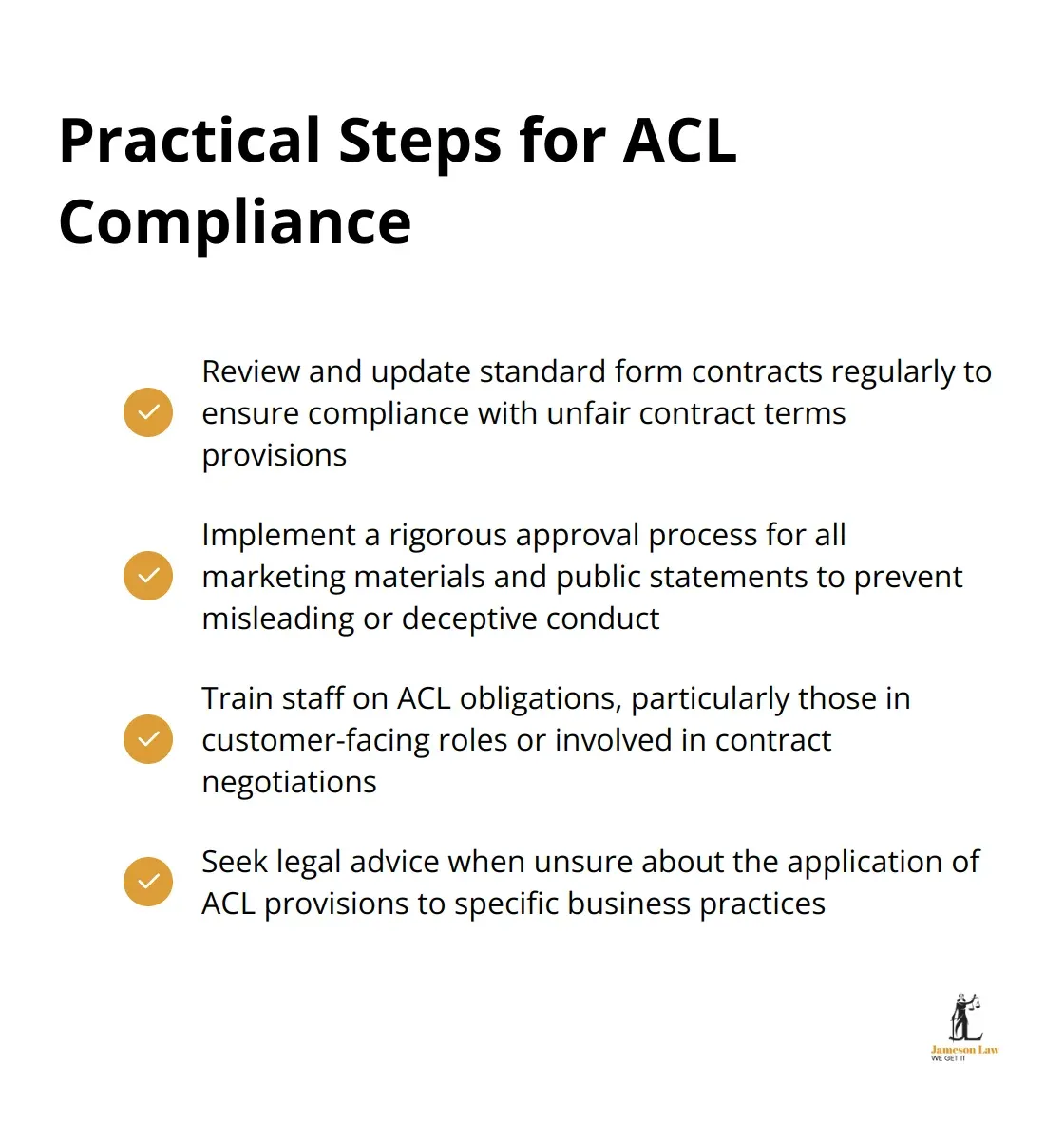Commercial law in Australia is a complex and ever-evolving field that impacts businesses of all sizes. Understanding its key concepts is essential for entrepreneurs, managers, and anyone involved in commercial activities.
At Jameson Law, we’ve created this comprehensive guide to help you navigate the intricacies of Australian commercial law. From contract fundamentals to consumer protection, we’ll break down the crucial elements you need to know to operate successfully in the Australian business landscape.
Contract Law Fundamentals: The Building Blocks of Commercial Agreements
The Four Essential Elements of a Valid Contract
Contract law forms the foundation of commercial transactions in Australia. A legally binding contract requires several key elements: offer, acceptance, consideration, intention to create legal relations, and capacity to contract.
- Offer: An offer represents a clear proposal to enter into an agreement. It must be specific and communicated to the other party. For instance, a supplier who emails a price list to a potential buyer makes an offer.
- Acceptance: Acceptance occurs when the other party agrees to the terms of the offer without modifications. If the buyer responds to the supplier’s email stating, “I’ll take 100 units at the listed price,” this constitutes acceptance.
- Consideration: Consideration involves something of value exchanged between the parties. It doesn’t necessarily have to be money – it could be goods, services, or even a promise to perform (or not perform) an action. In our example, the buyer’s payment and the supplier’s delivery of goods form the consideration.
- Intention to create legal relations: Both parties must intend for the agreement to be legally binding. In business dealings, this intention is usually presumed unless explicitly stated otherwise.

Common Types of Commercial Contracts
Several types of contracts frequently appear in Australian commercial law:
- Supply Agreements: These contracts prove vital for businesses that depend on regular deliveries of goods or services. They outline quality standards, delivery schedules, and payment terms.
- Distribution Agreements: These contracts set the terms for how a distributor will sell a manufacturer’s products. They often include exclusivity clauses and sales targets.
- Confidentiality Agreements (NDAs): These protect sensitive business information. Companies often use them when discussing potential partnerships or during the hiring process.
Breach of Contract and Available Remedies
A breach of contract happens when one party fails to fulfill their obligations. The two key types of remedies generally available for breach of contract are damages and specific performance.
For minor breaches, the non-breaching party might seek damages to cover any losses. In a recent case, an Australian small business received $50,000 in damages when a supplier failed to deliver goods on time, resulting in lost sales.
Major breaches may give the non-breaching party the right to terminate the contract and seek damages. For example, if a construction company abandons a project midway, the client might terminate the contract, hire another company to complete the work, and then sue for the additional costs incurred.
Specific performance represents another remedied where the court orders the breaching party to fulfil their contractual obligations. Courts often use this in real estate transactions where monetary damages might not suffice.
Well-drafted contracts can prevent costly disputes. By interpreting unclear terms against the drafter, the rule protects parties who have less negotiating power. We always advise our clients to invest time in negotiating clear terms and documenting agreements properly. It costs much less to get a contract right from the start than to litigate later.
As we move forwards, we’ll explore how different business structures in Australia impact contractual obligations and legal responsibilities. Understanding these structures proves essential for navigating the complexities of commercial law and making informed decisions for your business.
How Business Structures Shape Legal Responsibilities in Australia
Sole Trader: Simple Structure, High Risk
The sole trader structure is a significant part of the Australian business landscape. According to the Australian Bureau of Statistics, there were 2,662,998 actively trading businesses in Australia as of 30 June 2024. This structure offers simplicity and full control, but it comes with unlimited personal liability. Sole traders put their personal assets at risk if their business faces legal issues or debts.
Partnership: Shared Management, Shared Liability
Partnerships allow for shared management and resources, but they also involve shared liability. Each partner bears responsibility for the actions of other partners, which can lead to complex legal situations. A well-drafted partnership agreement proves essential to prevent disputes and clarify responsibilities.
Company: Limited Liability, Higher Compliance Burden
Companies offer limited liability protection but involve more complex governance requirements. The Australian Securities and Investments Commission (ASIC) oversees company compliance, with maximum prison penalties for the most serious offences increasing to 15 years. This structure requires careful consideration of the trade-off between protection and compliance burden.
Directors’ Duties: Navigating Legal Responsibilities
Directors of companies must navigate a complex landscape of responsibilities outlined in the Corporations Act 2001. The Australian Institute of Company Directors provides an overview of core legal duties that apply to directors under the Corporations Act and common law. These duties include:
- Acting in good faith in the company’s best interests
- Exercising powers for proper purposes
- Avoiding conflicts of interest
- Preventing insolvent trading
The consequences of breaching these duties can be severe.

Compliance: Meeting Legal Requirements
All business structures must meet various compliance requirements, regardless of their form. These obligations include:
- Annual tax returns and Business Activity Statements (BAS)
- Proper record-keeping for at least five years
- Adherence to industry-specific regulations
Companies face additional requirements, such as annual reviews, financial reports, and updates to director details.
The choice of business structure significantly impacts legal obligations, tax implications, and personal liability. As businesses evolve, their legal structure and compliance strategies should adapt accordingly. Regular reviews with a commercial law expert (such as those at Jameson Law) can ensure businesses remain protected and compliant in Australia’s dynamic business landscape. This proactive approach sets the stage for our next topic: consumer protection and fair trading practices in Australian commercial law.
How Australian Consumer Law Protects Businesses
Unfair Contract Terms: A Shield for Small Businesses
The Australian Consumer Law (ACL) is part of the Competition and Consumer Act 2010 and provides significant protections to businesses in their dealings with other businesses. As of November 9, 2023, changes to the unfair contract terms regime have come into effect, triggering essential changes for Australian businesses. These rules allow courts to void terms that create a significant imbalance in parties’ rights, are not reasonably necessary to protect legitimate interests, and would cause detriment if relied upon.
For example, a term allowing one party to unilaterally vary the contract without giving the other party the right to terminate would likely be considered unfair. Small businesses should review their contracts (especially those with larger companies) to identify and challenge potentially unfair terms.
Misleading and Deceptive Conduct: Truth in Business Dealings
The ACL’s prohibition on misleading and deceptive conduct applies to all aspects of business dealings. This includes advertising, marketing, negotiations, and after-sales service. The Australian Competition and Consumer Commission (ACCC) actively enforces this provision, with penalties for breaches reaching up to $10 million for companies.
A notable case involved a major telecommunication that received a $5 million fine in 2021 for making false or misleading representations about its internet speeds. This case underscores the importance of accuracy in all business communications and the severe consequences of non-compliance.
Consumer Guarantees: Protecting Business Purchasers
The ACL’s consumer guarantees also apply to business purchases in certain circumstances. These guarantees ensure that products and services meet certain standards, are fit for purpose, and match any descriptions or demonstrations provided. Businesses can rely on these guarantees when they purchase goods or services for less than $100,000, or for more than $100,000 if the goods or services are normally acquired for personal, domestic, or household use.
Practical Steps for ACL Compliance
To navigate the ACL effectively, businesses should:
- Review and update their standard form contracts regularly to ensure compliance with unfair contract terms provisions.
- Implement a rigorous approval process for all marketing materials and public statements to prevent misleading or deceptive conduct.
- Train staff on ACL obligations, particularly those in customer-facing roles or involved in contract negotiations.
- Seek legal advice when unsure about the application of ACL provisions to specific business practices.

Final Thoughts
Commercial law in Australia shapes how businesses operate, compete, and protect their interests. Clear contracts, appropriate business structures, and an understanding of consumer protection laws provide a strategic advantage in the marketplace. These legal frameworks demand ongoing attention as they evolve with the changing business landscape.
Expert guidance proves essential for businesses to navigate the complexities of commercial law in Australia. We at Jameson Law offer tailored legal solutions that align with your business goals. Our team of experienced commercial lawyers provides strategic advice and practical support for contract drafting, business restructuring, and consumer law issues.
Professional legal support allows businesses to transform potential legal hurdles into growth opportunities. We encourage you to address your legal needs proactively, review your contracts regularly, and seek expert advice for complex commercial matters. With the right legal partner, you can focus on running and growing your business while we handle the legal intricacies that underpin your success in the Australian market.










